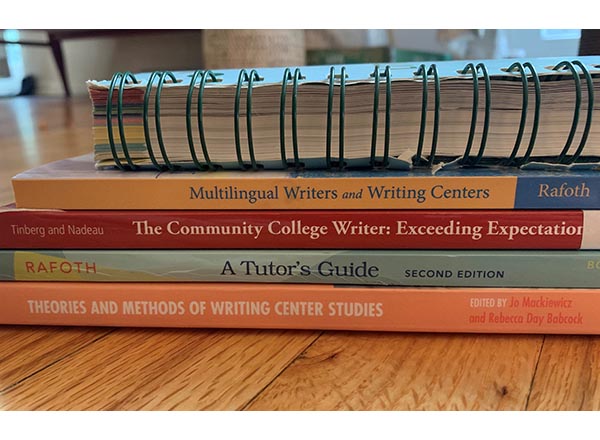Student Services Spotlight: The Writing Center

This article is part of a series highlighting our Student Services offices and what they can do for you. For information about all HFC student services, please visit the Student Services section of our website.
I n response to the pandemic, the Writing Center has transitioned to work remotely through an online system called WCOnline to provide asynchronous and synchronous appointments.
“All of our sessions remain one-on-one, no matter the format, so students are still receiving focused and personalized writing support from our Respondents,” said Writing Center director Chelsea Lonsdale. “Previously, we offered 30-minute face-to-face sessions in our on-campus location at the Eshleman Library. When we moved online, we changed that to 60 minutes, because we have found that communicating in a virtual environment takes more time. Students can still visit as often as needed. While we limit appointments to one-per-day and two-per-week, students can and do meet with us on a regular basis.”
WCOnline provides asynchronous and synchronous tutoring sessions
WCOnline has a built-in module for online sessions that includes audio, video, chat, and a shared screen. While eTutoring (asynchronous) sessions are most useful when a student has already composed a draft, online (synchronous) sessions are ideal no matter where a student is in the writing process, whether it’s brainstorming and talking through ideas before they’ve started writing, discussing where to go next in a draft, polishing a piece that is ready to be turned in, or making sense of instructor feedback before submitting a revised draft.
While most colleges and universities have a writing center, which makes the Writing Center at HFC unique is its staffing. The Respondents are all HFC adjunct faculty who teach in the English and Humanities departments or the English Language Institute (ELI), according to Lonsdale. Currently, the Writing Center has 11 Respondents and a full-time director.
“Eventually, we’d like to include peer tutors as well, but we’ve found that the Writing Center provides important opportunities for adjunct faculty to be involved with the College while getting paid for their expertise,” she said.
Online format = the same services and the same goals
When the pandemic forced the Writing Center to move its services to an online-only format, the top priority was maintaining a connection to campus for students. Lonsdale believes that the relationships students build with themselves, their writing, and the College as a whole are enhanced by the interactions they have with other campus stakeholders such as their peers, professors, staff, and Respondents in the Writing Center.
“So, in a sense, we’re still providing the same service with the same goals. However, we’ve had to adjust how we offer support. For example, we are now appointment-only, whereas before we were able to accommodate drop-in visits. Students can still make same-day appointments, though,” said Lonsdale.
Student responsibilities for success
In order to make their experience efficient and productive, students have responsibilities as well. First, students need to provide their draft(s) and their assignment instructions to the Respondents.
“I can’t tell you how many times we have to email students who make appointments but don’t provide all of the information we need. For eTutoring appointments, this information is required,” said Lonsdale. “For online appointments that take place virtually, those files can be shared during the appointment, so it’s not as much of an issue. We also need students to tell us what they want help with. The appointment form asks students to list 1-3 questions they have for their Respondent. Those questions can be things like ‘I’m feeling stuck. Can you help me think about what I could add?’ or ‘I need help documenting my sources.’”
Saturday and evening appointments
Appointments are available throughout the day, beginning between 9:00 and 10:00 a.m. On some days, Respondents are available as late as 9:00 p.m. and there are also Saturday hours. Appointments for the Fall 2020 Semester end on Friday, Dec. 18.
“One positive change that has come about in response to the pandemic is being able to offer evening and weekend hours,” said Lonsdale. “Before, we were limited by the library building hours, but shifting our services to an online format has allowed us to expand our schedule. Those time slots seem to be the most popular, which makes sense. Students often do their homework at night and on weekends, and now we can offer support during those times.”
Writing Center open to HFC faculty/staff – not just students
Lonsdale pointed out that the Writing Center is open to anyone affiliated with HFC, including faculty and staff – not just students.
“Though most of our sessions are with students who want extra help, we also work with experienced writers who feel pretty confident in their writing abilities and just want another person to bounce ideas off of,” she said. “There’s this myth that writing has to be an isolated, individual activity that happens quietly in our heads, but that couldn’t be farther from the truth. Writing, whether it’s for a class, a job, or for personal benefit, is a social activity. When we write, we write to connect with an audience (even if that audience is yourself), and it can be incredibly helpful to work with someone who can act as that audience and provide feedback to help you communicate effectively. We’re not here to judge anyone’s writing abilities, but we can absolutely help you recognize your strengths and weaknesses and can provide strategies, resources, and encouragement to help you grow.”
To make an appointment, visit WCOnline. For questions or further information about the Writing Center, contact writingcenter@hfcc.edu.